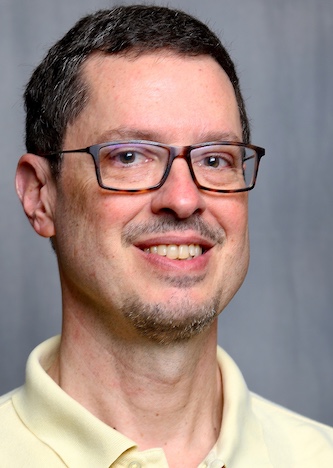James Glapa-Grossklag is Dean of Educational Technology, Learning Resources, and Distance Learning at College of the Canyons. He previously served as President of the Community College Consortium for OER (CCCOER), President of the Directors of Educational Technology in California Higher Education, Board President of the Open Education Consortium. He is currently Technical Assistance Provider for the California Community College Zero Textbook Cost Degree Program. He took some time to share his perspective on the different impacts that expensive textbooks and no-cost open educational resources have on students.

This interview has been edited and condensed for clarity and length.
As an educator, how does the textbook affordability issue impact students?
The cost of textbooks has a documented and demonstrable impact on the choices students make, particularly at public community colleges. Some students choose whether to register for a class or not based solely on whether they can afford the textbook. Many have to choose between purchasing class materials or using that money to buy food, take care of their family, or even put gas in the car so they can at least sit in the classroom.
How would you say these tough monetary choices affect students’ perception of college institutions?
It causes the students to be cynical about the people in public higher education. That we’re nickel and diming them, we’re squeezing them at every turn. There’s a health fee, registration fee, application fee, parking fee, on and on. On top of that, we’re requiring them to purchase expensive instructional materials. They feel that the rich can get an education, and the poor can’t. So there’s this general attitude among students that “the system sucks.”
How do open education resources (OER) bring about change in perception and behavior?
Research from the Open Education Group demonstrates that students view faculty who use no-cost OER as being more empathetic, kinder, etc. OER also stops institutions from implicitly encouraging criminal behavior. Rather than purchase expensive textbooks, many students simply go online and find pirated materials, and they’re comfortable with that. They don’t see it as criminal, rather in their opinion and even that of many parents, using pirated materials is something to be lauded as enterprising or positive behavior.
I know you’re publishing your own open content at College of the Canyons. Care to highlight any?
Here, our small but mighty OER team has worked along with our faculty members to adapt or author 34 open textbooks. We have 30 or so on our project list. In addition, we have dozens of faculty who are using sources like OpenStax. We believe 25% of our classes and 35% of our students are using OER in some form.
And you’re relying on students to help in implementing and sustaining your OER initiative.
I wish they were full-time employees, but they are current or former students who are passionate about OER. There are many ways to create an OER team by hiring faculty instructors and librarians to lead the charge. But I’m proud that we’re empowering these young people in this cause, and they are better advocates than I can ever be. They understand that OER is the future and should be the default.
So how does migrating to OER benefit student achievement?
In American public higher education there’s a reform movement aimed at reducing what’s called the “achievement gap.” For example, someone simply born a white male from an upper-class family will likely attain higher educational achievement compared to a female person of color from a lower socioeconomic group. Studies show that moving to OER increases grades for all, but the effect is more pronounced looking at Pell-eligible students and non-white students. It helps to reduce the achievement gap.
How do guided pathways and Zero Textbook Cost (ZTC) degrees fit into the current reform movement?
We’ve spent a lot of time, especially in California, talking about access, which is why you bump into a local community college at every street corner. Everyone can get into one, but not everyone succeeds in getting out. Constructing a focused pathway, much like they do in graduate programs, centered around OER, so students are never surprised by instructional material costs, can guide them to a zero textbook cost degree.
Can you share the success rates of students taking OER/ZTC courses at College of the Canyons?
In spring 2018, 71% of all students completed a course with a C or better, that number jumps to 75% for those pursuing a ZTC degree. If we look at Pell recipients, 68% of students achieved a C or better, but ZTC Pell students had a success rate of 74%. The differences are even more pronounced looking at African American male students who are Pell recipients – 49% for those in non-OER classes, 62% for those in OER classes. So success is taking root in California community colleges.
If you had a magic wand and could solve one big issue surrounding textbook affordability, what would it be?
The issue I would solve is self-awareness on the part of institutions of the choices we’re making our students face. We offer things like free WiFi and access to libraries because it helps students succeed in college and contributes to a positive experience. Yet when it comes to the important matter of instructional materials we outsource that to third-party private companies and put the costs on the backs of our students, and I want everyone in higher education to be aware of the contradiction in our choices.
Tell me about your work at the Open Education Consortium (OEC).
I’ve been tremendously honored to be the first community college representative on the board of the OEC, and later elected president. It’s a strong reflection on the increased importance of OER in US community colleges, and recognition of the impact community colleges are having on higher education as a flexible model of education. The OEC organizes global conferences that serve as a venue for exchanging OE ideas. We’ve been able to identify open resources for our colleagues in the States that are being used all around the world.
Any parting words you’d like to share?
I want to thank Michelson 20MM Foundation for supporting our work in creating a network of student OER advocates across California state universities and community colleges. It has the potential to set an example to embed OER advocates in institutions around the globe.
Open resources allow students to keep money in their pockets and contribute to the local economy. Not spending $100 on a textbook means a student can eat. It keeps the money in their communities rather than sending it to a publisher, and it contributes to the local tax base, increasing local jobs. If there’s an economist reading this who is capable of helping quantify the local economic impact of OER, I would love to hear from them at james.glapa-grossklag@canyons.edu.
The Michelson 20MM Foundation and its initiatives are made possible by the generous support of Gary K. Michelson, M.D. and his wife, Alya Michelson.
